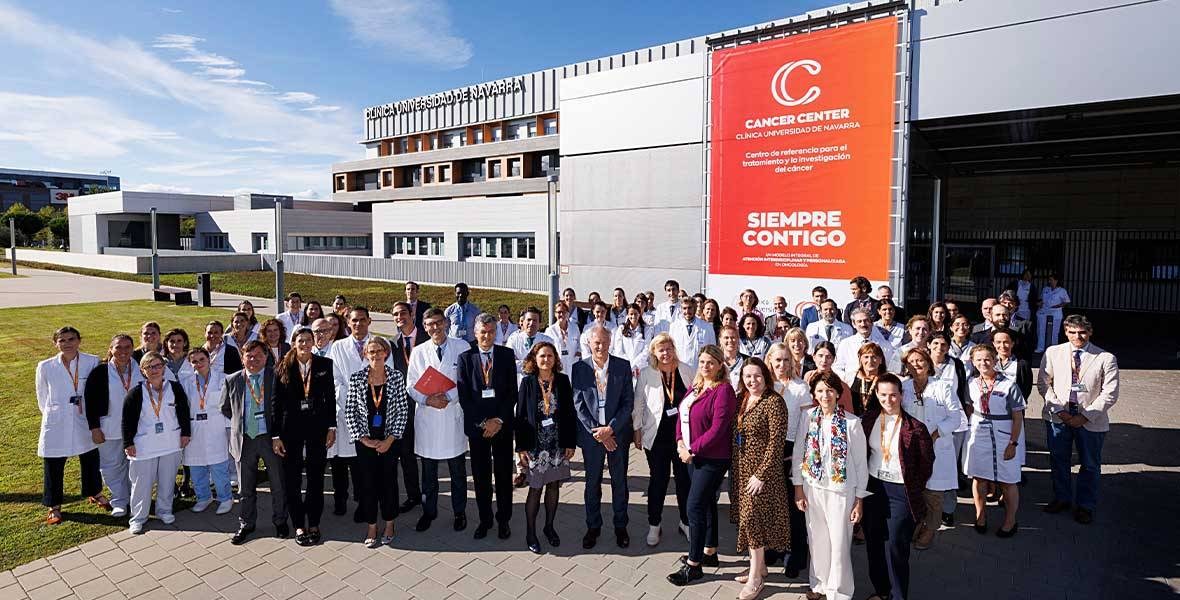Cancer Center Clínica Universidad de Navarra Receives European Accreditation for Offering Oncology Care that the EU Requires by 2030
The Organization of European Cancer Institutes has accredited the healthcare, research, and teaching quality of the Cancer Center Clínica Universidad de Navarra as a comprehensive cancer center, making it the first non-public center of its kind in Spain.

May 21, 2025
The Organization of European Cancer Institutes (OECI) has accredited the Cancer Center Clínica Universidad de Navarra (CCUN) as a comprehensive cancer center after evaluating the quality of its healthcare, research, and teaching activities. The OECI has recognized the CCUN as the first non-public center of this type in Spain, and the second after the Vall d’Hebron Institute of Oncology (VHIO) at the Vall d’Hebron Hospital in Barcelona.
The CCUN will receive its accreditation certificate in Athens during the OECI annual assembly in the second week of June. Thus the University of Navarra Cancer Center, with locations in Pamplona and Madrid, joins the group of 40 leading European centers in comprehensive cancer care. The accreditation of the CCUN puts it five years ahead of the European Cancer Plan guidelines, which aim to promote comprehensive cancer centers—and networks of collaboration between them—by 2030, to offer high-quality oncology care to most European patients.
Unlike the traditional organization of hospitals, a cancer center revolves around the work of interdisciplinary areas, defined by different tumors, to achieve the most personalized care for each patient. As explained by Dr. Antonio González, director of the CCUN, in this new model already in place, “a team of doctors from different specialties and expert oncology nurses work on each case, assessing the diagnosis, agreeing on the best available treatment for those people, and monitoring the results of the therapies. Now, the OECI accreditation certifies that there are quality plans that guarantee this comprehensive and personalized oncology care.”
Dr. Antonio González emphasizes that “clinical research is key in a cancer center, specifically offering therapeutic alternatives with clinical trials, especially in their early development phases,” and adds that care “goes beyond medical assistance: we offer comprehensive support with the participation of other areas, such as the symptom support and control team, psycho-oncology, nutrition, rehabilitation, or social guidance, because cancer affects all spheres of life and a cancer center must respond to all needs.”
Dr. González considers that the accreditation of the CCUN in Pamplona and Madrid “is excellent news, also for Spanish Medicine and Oncology, as it confirms the high level of Oncology in our health system. The path started by the VHIO and now by the CCUN will serve as an incentive for the accreditation of other Spanish centers.”
“In the next five years, we have the challenge of strengthening collaboration ties between comprehensive cancer centers in our country and those already existing in Europe. This collaboration will enhance the capabilities of each center and allow us to offer the best care to patients,” concludes Dr. González.
Since 2018, an oncology center also dedicated to research and teaching
Along with the healthcare work of its 14 interdisciplinary areas, the accreditation of the CCUN has been possible due to the integration of translational and preclinical research developed at the Clinic and by the programs and groups integrated into the Cancer Division of the Cima Universidad de Navarra. Additionally, the recognition as a comprehensive cancer center has considered its link with the University of Navarra, which allows the development of training programs for clinical specialists and biomedical researchers.
María Iraburu, rector of the University of Navarra, noted that “Oncology has been a priority line of the University of Navarra’s 2025 Strategy, and we are pleased that it has materialized in the European accreditation of the CCUN. With this step, the University reaffirms its commitment to offering the best medical care and scientific advances to the patients of its cancer center.”
The CCUN took its first steps in 2017. In February 2022, it was publicly presented in both Pamplona and Madrid. Since then, it has received the Accreditation Centers Foundation of the Scientific Foundation of the Spanish Association Against Cancer, which will facilitate the funding of its research projects. Also with the AECC, it has agreed to work towards humanizing the treatment of people with cancer and their families.
The Clínica Universidad de Navarra Cancer Center also has scientific support from the CRIS contra el cáncer Foundation and the AECC. Internationally, it maintains an agreement with the University of Oxford for research and development of clinical trials in immunotherapy, reached an agreement with Johns Hopkins for proton therapy training in Spain, and participates in several clinical research networks such as Astra Zeneca’s Partners of Choice, Roche’s ImCore, or BMS’s International Immuno-Oncology Network. Additionally, the CCUN is the first center certified in Spain by the European societies of breast cancer specialists (EUSOMA) and hematopoietic progenitor transplantation (JACIE), and five of its specialists have recently been recognized among the most cited researchers in the world.
In recent months, in the context of its healthcare activity, the CCUN has achieved other milestones, such as the first 1,000 patients of its pioneering Proton Therapy Unit, the launch of a new radiotherapy accelerator guided by magnetic resonance imaging, or the launch of an application open to the entire population that calculates the risk of developing hereditary cancer.
The 550 medical specialists, researchers, teachers, nursing professionals, and other disciplines at the CCUN attend to more than 3,000 new patients each year. In 2024, 303 research projects were developed, and 230 high-impact scientific publications were produced. There are 486 active clinical trials.

